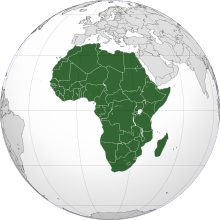African studies

African studies is the study of Africa, especially the continent's cultures and societies (as opposed to its geology, geography, zoology, etc.). The field includes the study of Africa's history (Pre-colonial, colonial, post-colonial), demography (ethnic groups), culture, politics, economy, languages, and religion (Islam, Christianity, traditional religions). A specialist in African studies is often referred to as an "Africanist". A key focus of the discipline is to interrogate epistemological approaches, theories and methods in traditional disciplines using a critical lens that inserts African-centred ways of knowing and references.
For Africanists, also known as communitarians, problems within Africa are thought to be caused because the real flesh-and-blood communities that comprise Africa are marginalized from public life as so many "tribes". Therefore, the solution is understood to be the need to defend culture and put Africa's age-old communities at the center of African politics. It is also argued that there is a need to "deexoticize" Africa and banalise it, rather than understand Africa as exceptionalized and exoticized.[1]
Notable deceased Africanists
- Chinua Achebe (1930-2013)
- J. F. Ade Ajayi (1929-2014)
- Abdulrahman Mohamed Babu (1924-1996)
- François Bassolet (1933-2001)
- Albert Adu Boahen (1932–2006)
- Amílcar Cabral (1924-1973)
- Gwendolen M. Carter (1906-1991)
- Patrick Chabal (1951-2014)
- John Henrik Clarke (1915-1998)
- Basil Davidson (1914-2010)
- Kenneth Dike (1917-1983)
- Cheikh Anta Diop (1923–1986)
- Stephen Ellis (1953-2015)
- John Fage (1921–2002)
- Frantz Fanon (1925-1961)
- Joseph Greenberg (1915-2001)
- Marcel Griaule (1898-1956)
- William Leo Hansberry (1894-1965)
- Melville Herskovits (1895-1963)
- Manuel Iradier (1854–1911)
- Ali Mazrui (1933-2014)
- Carl Meinhof (1857–1944)
- Kwame Nkrumah (1909-1972)
- Julius Nyerere (1922-1999)
- Roland Oliver (1923-2014)
- Jean Price-Mars (1876–1969)
- Terence Ranger (1929-2015)[2]
- Robert Sutherland Rattray (1881–1938)
- Walter Rodney (1942–1980)
- Justinian Rweyemamu (1942-1982)
- Jean Suret-Canale (1921–2007)
- Diedrich Westermann (1875–1956)
- Ivor Wilks (1928-2014)
- Andrzej Zajączkowski (1922–1994)
University-based centers
- Center for African Studies, University of Addis Ababa, Ethiopia
- Centre of African Studies, University of Cambridge
- Department of African, Middle Eastern, and South Asian Languages and Literatures at Rutgers, the State University of New Jersey
- African Studies Center, Michigan State University
- Afrika-Studiecentrum, Leiden
- Centre of West African Studies
- School of Asian and African Studies, Beijing Foreign Studies University
- School of Oriental and African Studies
- School of Asian and African Studies, Shanghai International Studies University
- University of Florida Center for African Studies
- Centre for African Studies (CAS), University of Cape Town
- Institute of African Studies, Carleton University, Ottawa, ON
- Institute of African Studies, University of Bayreuth, Germany
National and transnational centers
Associations
- African Studies Association (North America)
- AEGIS (Europe)
- African Studies Association of Australasia and the Pacific (Australasia and the Pacific)
Projects
- Bamum Scripts and Archives Project
- Timbuktu Manuscripts Project
- Internet library sub-saharan Africa (ilissAfrica)
Degree programs
United States of America Howard University, PhD
- Florida International University, Masters in African Studies, African Studies Certificates
- Ohio University, Masters in African Studies
- Beloit College, African Studies Minor - Interdisciplinary undergraduate minor field of concentration
- Rutgers University, undergraduate major and minor in African, Middle Eastern, and South Asian Languages and Literatures, with a regional focus
Canada
- Carleton University, Institute of African Studies - Combined Honours Undergraduate Degrees and Collaborative Masters in African Studies
Egypt
- Cairo University, Institute of African Research and Studies
Ethiopia
- University of Addis Ababa, Center for African Studies
Ghana
- University of Ghana Masters and PhD in African Studies
Nigeria
- University of Ibadan, Nigeria Masters and PhD in African Studies
Switzerland
United Kingdom
Further reading
- Gershenhorn, Jerry. “‘Not an Academic Affair’: African American Scholars and the Development of African Studies Programs in the United States, 1942–1960.” Journal of African American History, 94 (Winter 2009), 44–68.
- Gershenhorn, Jerry. “St. Clair Drake, Pan-Africanism, African Studies, and the Politics of Knowledge, 1945-1965.” Journal of African American History, 98 (Summer 2013), 422-433.
See also
- List of African studies journals
- Africa Bibliography for a categorised list of publications in the field since 1984
- Pan-Africanism
- Africana studies
- Cinema of Africa
External links
- African e-Journals Project, Michigan State University (Provides (1) a directory of more than 2,100 journals about Africa with their URLs, and where to find tables of contents, abstracts, and full text of articles online, and (2) a full-text archive of back issues of 11 African scholarly journals in the social sciences and humanities.)
- African Studies Centres worldwide (Excerpt of the website database of ilissAfrica)
- AFRICAN STUDY: African Language Publishing For Children In South Africa (This African study focuses on the dearth of teaching and learning materials in African languages required to deliver effective bilingual education, and on the potential role of translation in offering solutions for this problem.)
Library Guides for African Studies
- "Help for Researchers: Africa". British Library.
- "African Studies Research Guides". New York, USA: Columbia University Libraries.
- "African Studies & African History". Research & Subject Guides. Washington DC: Georgetown University Library.
- "African Studies Internet Portal". University of Illinois LibGuides. USA: University of Illinois at Urbana-Champaign, University Library.
- "African Studies". LibGuides. USA: University of Iowa Libraries.
- Library. "African Studies". Topic Guides. UK: London School of Economics and Political Science.
- "Africana Studies". Research Guides. USA: New York University Libraries.
- "Africana". LibGuides. USA: Northwestern University, Melville J. Herskovits Library of African Studies.
- "African Studies". Oxford LibGuides. Oxford, UK: University of Oxford, Bodleian Libraries.
- "African Studies Resources". Princeton LibGuides. USA: Princeton University Library.
- University Libraries. "African Studies". Research Guides. New Jersey, USA: Rutgers University.
- African Studies Library, Centre of African Studies, University of Cambridge UK
- Studying Africa. A guide to the sources. Nordic Africa Institute, Uppsala. 3rd ed., 2014
References
- ^ Mamdani, M. (1996), Chapter 1 from Mamdani, M., Citizen and Subject: contemporary Africa and the legacy of late colonialism.
- ^ Tribute in ACAS Review 89, incl. bibliography (2015)
